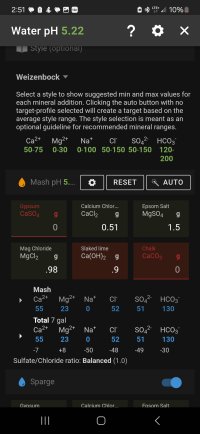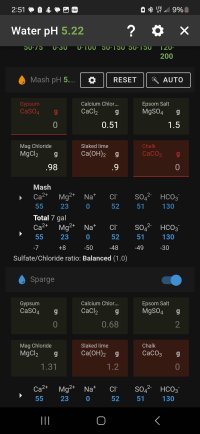Need help checking my work
First brew attemt, don't have ro access, tap water not a viable choice for me. Starting with distilled and already have all the salts so I'm not Not going to use them.
This is what I have so far
0.49 g — Chalk (CaCO3) — Mash
0.79 g — Epsom Salt (MgSO4) — Mash
0.49 g — Gypsum (CaSO4) — Mash
8 ml — Lactic Acid 80% — Mash
0.79 g — Magnesium Chloride (MgCl2) — Mash
0.49 g — Slaked Lime (Ca(OH)2) — Mash
0.83 g — Calcium Chloride (CaCl2) — Sparge
0.65 g — Chalk (CaCO3) — Sparge
1.05 g — Epsom Salt (MgSO4) — Sparge
0.65 g — Gypsum (CaSO4) — Sparge
2.54 ml — Lactic Acid 80% — Sparge
1.05 g — Magnesium Chloride (MgCl2) — Sparge
0.65 g — Slaked Lime (Ca(OH)2) — Sparge
recipe
71% efficiency
Batch Volume: 4.5 gal
Boil Time: 60 min
Mash Water: 5.16 gal
Sparge Water: 1.55 gal
Total Water: 6.72 gal
Boil Volume: 5.76 gal
Pre-Boil Gravity: 1.064
Vitals
Original Gravity: 1.074
Final Gravity: 1.017
IBU (Tinseth): 17
BU/GU: 0.23
Color: 7.6 SRM
Mash
Strike Temp — 207.9 °F
protien — 99 °F — 30 min
ferulic rest — 112 °F — 40 min
sacch' rest — 145 °F — 60 min
after — 150 °F — 30 min
Malts (12 lb 6.9 oz)
5 lb 10.7 oz (45.6%) — Cargill Wheat White — Grain — 2.7 °L — Mash — 90 min
3 lb 13.4 oz (30.9%) — Pilsner Malt — Grain — 1.8 °L — Mash — 90 min
2 lb 14.9 oz (23.6%) — Munich Malt, Germany — Grain — 7.6 °L — Mash — 90 min
Hops (0.36 oz)
0.36 oz (17 IBU) — Magnum 12% — First Wort
First brew attemt, don't have ro access, tap water not a viable choice for me. Starting with distilled and already have all the salts so I'm not Not going to use them.
This is what I have so far
Miscs
0.62 g — Calcium Chloride (CaCl2) — Mash0.49 g — Chalk (CaCO3) — Mash
0.79 g — Epsom Salt (MgSO4) — Mash
0.49 g — Gypsum (CaSO4) — Mash
8 ml — Lactic Acid 80% — Mash
0.79 g — Magnesium Chloride (MgCl2) — Mash
0.49 g — Slaked Lime (Ca(OH)2) — Mash
0.83 g — Calcium Chloride (CaCl2) — Sparge
0.65 g — Chalk (CaCO3) — Sparge
1.05 g — Epsom Salt (MgSO4) — Sparge
0.65 g — Gypsum (CaSO4) — Sparge
2.54 ml — Lactic Acid 80% — Sparge
1.05 g — Magnesium Chloride (MgCl2) — Sparge
0.65 g — Slaked Lime (Ca(OH)2) — Sparge
recipe
71% efficiency
Batch Volume: 4.5 gal
Boil Time: 60 min
Mash Water: 5.16 gal
Sparge Water: 1.55 gal
Total Water: 6.72 gal
Boil Volume: 5.76 gal
Pre-Boil Gravity: 1.064
Vitals
Original Gravity: 1.074
Final Gravity: 1.017
IBU (Tinseth): 17
BU/GU: 0.23
Color: 7.6 SRM
Mash
Strike Temp — 207.9 °F
protien — 99 °F — 30 min
ferulic rest — 112 °F — 40 min
sacch' rest — 145 °F — 60 min
after — 150 °F — 30 min
Malts (12 lb 6.9 oz)
5 lb 10.7 oz (45.6%) — Cargill Wheat White — Grain — 2.7 °L — Mash — 90 min
3 lb 13.4 oz (30.9%) — Pilsner Malt — Grain — 1.8 °L — Mash — 90 min
2 lb 14.9 oz (23.6%) — Munich Malt, Germany — Grain — 7.6 °L — Mash — 90 min
Hops (0.36 oz)
0.36 oz (17 IBU) — Magnum 12% — First Wort













































![Craft A Brew - Safale BE-256 Yeast - Fermentis - Belgian Ale Dry Yeast - For Belgian & Strong Ales - Ingredients for Home Brewing - Beer Making Supplies - [3 Pack]](https://m.media-amazon.com/images/I/51bcKEwQmWL._SL500_.jpg)













